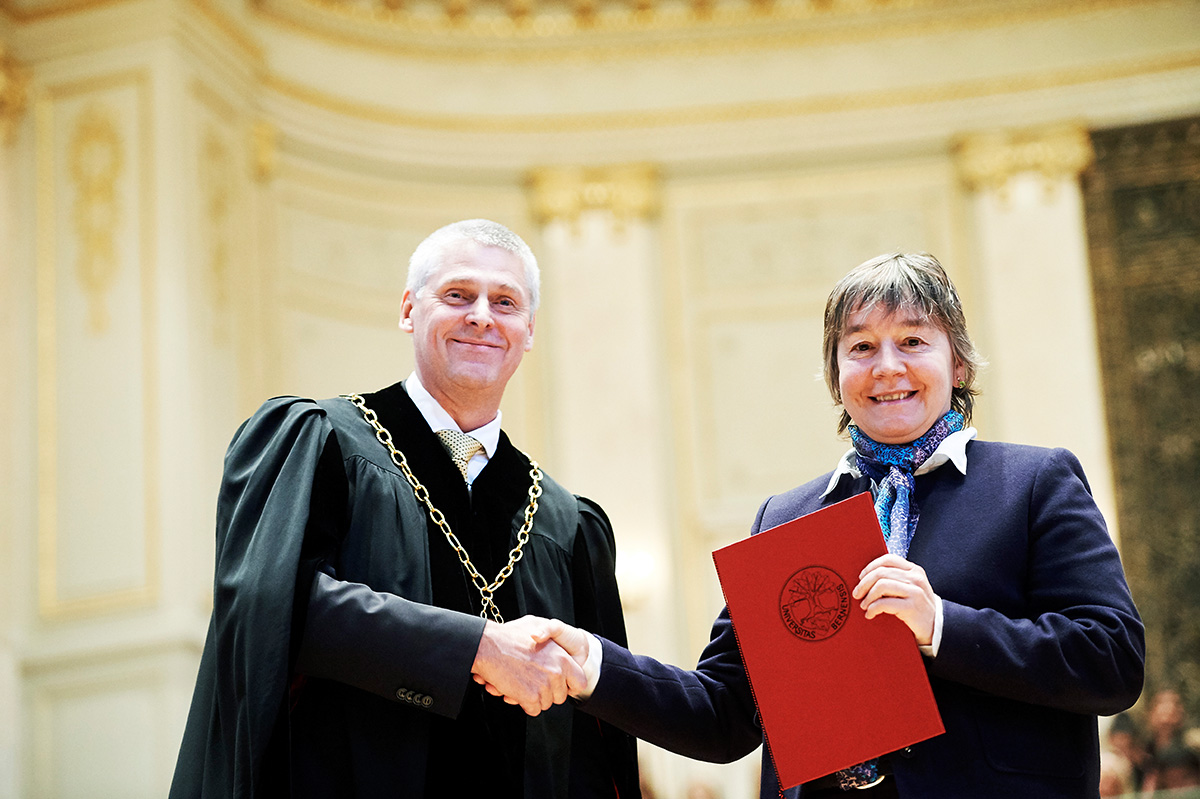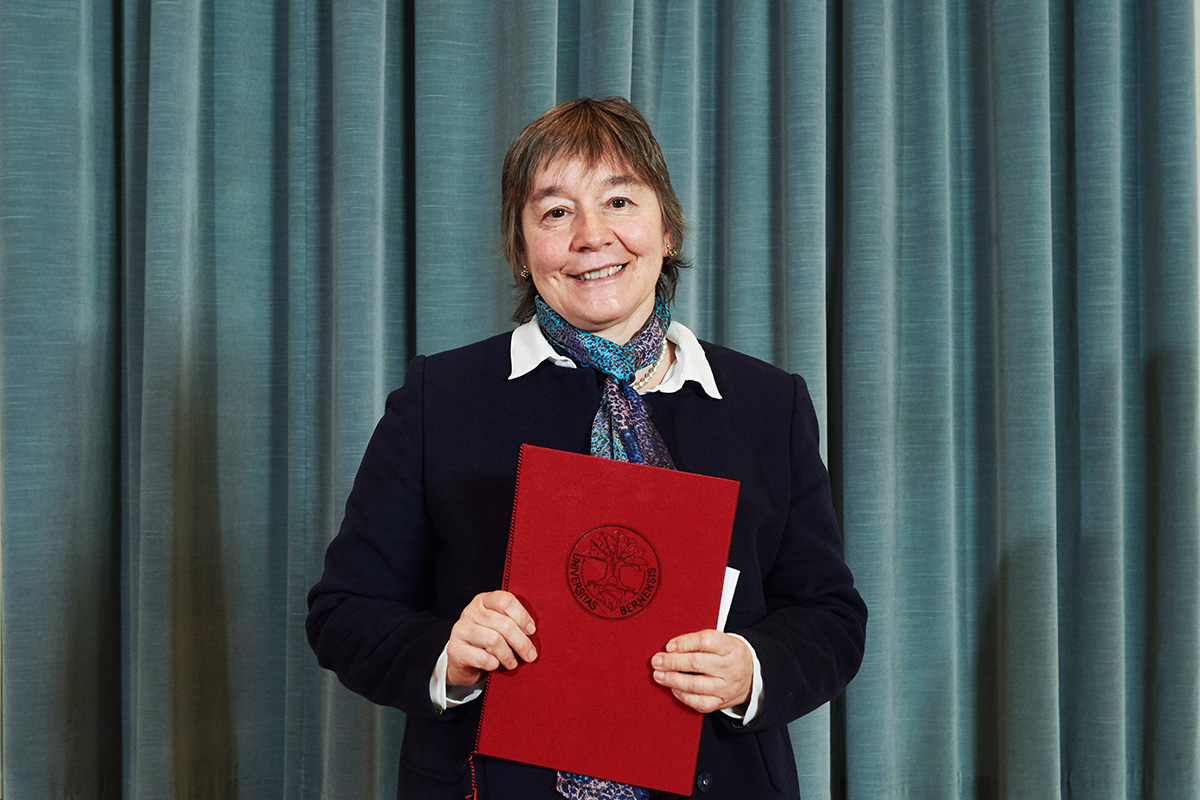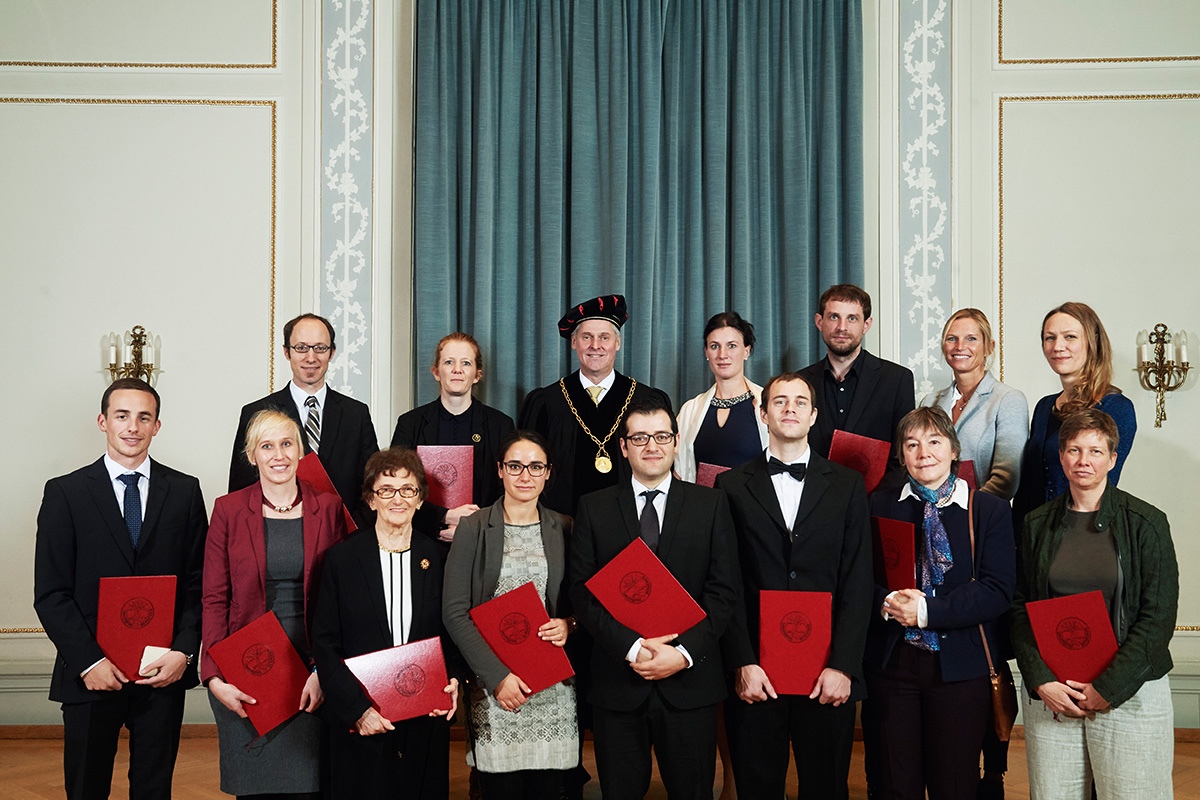Prize for groundbreaking work on the impact of humans on the climate system
On the occasion of this year's Dies academicus, climatologist Prof. Dr. Gabriele Hegerl was awarded the Hans Sigrist Prize from the University of Bern, together with a sum of 100,000 Swiss francs. Hegerl was recognised for her research on the impact of humans on the climate system. "uniaktuell" had the chance to be present when the Hans Sigrist Foundation conducted its traditional interview with the prize winner.
Chatting to the manager of the Hans Sigrist Foundation and "uniaktuell", Gabriele Hegerl explains that she first came into contact with the topic of climate change by being an Alp enthusiast. As she went hiking, or took skiing trips in the mountains, she noticed that the glaciers were retreating further and further; on maps borrowed from the Swiss Alpine Club, she noticed that the glaciers used to be much taller. Nowadays, Hegerl is renowned for her research within the field of climate change and has hugely contributed to identifying and quantifying the extent to which climate change has been caused by humanity.

From mathematics to climatology
After studying mathematics and gaining a PhD in Applied Mathematics from the Ludwig-Maximilians University in Munich, Hegerl applied to the Max Planck Institute for Meteorology in Hamburg. She did this, in her own words, because she found it exciting to find out whether any climate data existed, which could prove that climate change is caused by humanity. Even today, her research still revolves around pinpointing the fluctuations in data which can be traced back to climate change, as well as identifying how specific factors, such as greenhouse gas emissions, influence the climate system. What’s more, a distinction needs to be made between those changes in climate caused by humans, and those resulting from variable climate and weather conditions, and shifts in natural factors, such as solar radiation. In 2001, she became an Associate Research Professor at the Duke University, North Carolina and since 2009 she has been a professor in Climate System Science at the University of Edinburgh.
Longstanding commitment to the Intergovernmental Panel on Climate Change
Gabriele Hegerl is particularly fond of her longstanding commitment to the Intergovernmental Panel on Climate Change (IPCC), a body which prepares scientific research findings on climate development for the political decision-makers. Not only was Hegerl the lead author of the IPCC Assessment Report on Climate Change AR3 (2001), AR4 (2007) and AR5 (2013), but she was also a member of the core writing team for the IPCC AR5 Synthesis Report (2014). During the writing of this report, she managed one of the four subject areas and was involved in three plenary sessions during which the report was discussed and approved by the authorities. She explains that the process involved in writing a report is very exciting. "You’re working together with the top researchers in the field of climatology. This means you can examine the topic from various perspectives and reach an agreement in the end, meaning all those involved can stand behind the assertions in the report.“

"It's not an option to either believe, or not believe, in climate change"
Hegerl believes that politicians should think more about the long term, as nothing much changes during one legislative period. "If we do something to combat climate change, we can't necessarily feel the effects immediately. It'll be our children and grandchildren who benefit from our action. Yet they'll also have to pay the price if we sit back and do nothing. However, I do believe that humanity can tackle the problem by being inventive."
Hegerl is concerned that there appears to be a certain scepticism towards expert opinions; concrete scientific findings should be the basis for making decisions. She finds that a lot of the challenges and problems we face are so complex that we can't afford not to rely on what the experts are telling us. She explains that climate change isn't just a myth that you can either choose to believe or not. Actually, it is scientifically proven by means of data, models and analyses. Yet she also states that, as a scientist, it isn't up to her to advise one way or another within the political arena: "The role of politics is to carefully weigh up the various requirements and find solutions. As a scientist, I can point out that if we don't put climate change first, then we will end up paying a steep price in the years to come."

"The Hans Sigrist Prize is an acknowledgment of all my hard work"
So what connection does she have with the University of Bern? Both Hegerl and her late husband Thomas Crowley, who was also a climatologist, often used to work together with climate researchers in Bern. In 2011, she was invited to be one of the keynote speakers at the NCCR Climate Summer School held by the University of Bern’s Oeschger Centre for Climate Change Research (OCCR) in Grindelwald. In 2015, she lectured at a conference held at the University of Bern to celebrate the bicentenary of the eruption of Mount Tambora. Hegerl explains how much she values exchanging specialist knowledge with colleagues in Bern and how she loves working together with other researchers; it is inspiring to examine issues from various scientific perspectives and discuss them together.
And what will she do with the prize money? Laughing, she explains that she already knew on her trip to Bern that she might have to answer such a question. Her research is partly financed by an ERC grant which is due to run out in a year. Hegerl has a relatively large research group, so the money is welcome. She is excited to be able to further her research into extreme weather conditions and how they correlate to climate change. Yet for Gabriele Hegerl, the prize means first and foremost being recognised for her research. "The Hans Sigrist Prize is a nice way of acknowledging that my research is being appreciated and that all my hard work is paying off at last", the amiable researcher modestly explains.
About the person
Prof. Dr. Gabriele Hegerl
Born in Munich in 1962
1992 Doctorate in Mathematics, Ludwig-Maximilians University, Munich
2001 Associate Research Professor at the Duke University, North Carolina
Since 2009, she has been a professor in Climate System Science at the University of Edinburgh, UK
Lead author of the UN IPCC Assessment Report on Climate Change AR3 (2001), AR4 (2007) and AR5 (2013)
Member of the core writing team for the IPCC AR5 Synthesis Report (2014)
Various leadership roles in the World Climate Research Programme (WCRP)
Fellow of the Royal Society of Edinburgh and fellow of the American Geophysical Union
THE HANS SIGRIST PRIZE
Prof. Dr. Gabriele Hegerl has been awarded the Hans Sigrist Prize on recommendation from the Faculty of Science. In each case, the Hans Sigrist Foundation Board chooses the scientific field from various suggestions, then an international panel of experts nominates researchers in this field from both Switzerland and abroad. The Foundation Board has the final decision on the prize winner. The prize money can be used by the winner at their own discretion within the scope of their research goals.
About the author
Brigit Bucher works as the Deputy Manager of Corporate Communication at the University of Bern, and is an editor at “uniaktuell”.